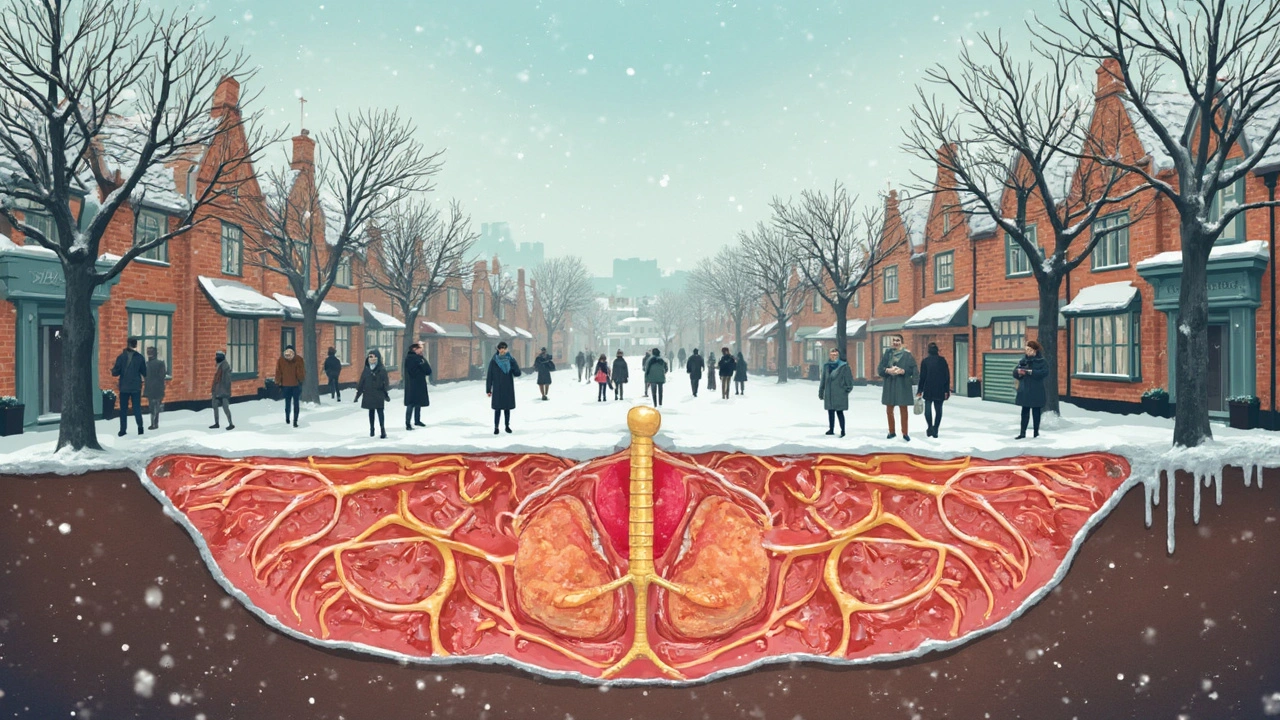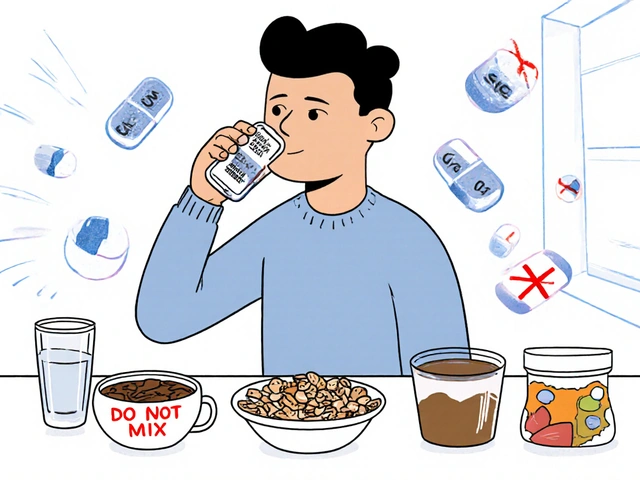Ever notice how a tickle in your throat turns into a pesky cough as soon as the seasons start to shift? You're definitely not alone. Those changes in the weather can do a number on our respiratory systems, and before you know it, you're hacking away.
So, why do coughs seem to pop up when the seasons change? For starters, cooler air can lead to dry, irritated throat and air passages. Not to mention how allergens in the air like pollen or dust can also kickstart a coughing fit. And let's not forget about the common cold—ever the uninvited guest!
But don’t sweat it, there are ways to tackle this. A few practical steps, like staying hydrated, using a humidifier, and even trying some age-old home remedies, can make a difference. Plus, knowing when you should really see a doctor can save you a lot of trouble.
- Understanding Seasonal Coughs
- Common Triggers
- When to Worry
- Home Remedies
- Prevention Tips
- Lifestyle Adjustments
Understanding Seasonal Coughs
When it comes to coughs and seasonal changes, there's more happening behind the scenes than you might think. As temperatures drop, the air often becomes drier. This can irritate the throat and airways, making a cough more likely to occur. During colder months, we also spend more time indoors, increasing exposure to indoor allergens such as dust and mold.
Why Coughs Peak in Certain Seasons
The transition from summer to fall and winter disrupts our usual routine, and with that comes extra challenges for our immune system. With the chillier air, people are more prone to catching colds, which are notorious for causing a persistent cough. Sometimes, it’s not just the cold; it's the flu deciding to crash the party too.
Common Symptoms
Spotting a seasonal cough isn’t too tricky. Watch out for a dry, scratchy throat, hoarseness, and that never-ending itch in your throat that makes you want to cough again and again. If you hear a persistent, dry cough echoing through your house, it could be the usual seasonal suspect.
Allergies or Something Else?
Sometimes, it's not just the cold air—seasonal allergies can also stir up trouble. Pollen in spring or ragweed in late summer can be culprits. If your cough comes with sneezing and itchy eyes, allergies might just be the reason behind it.
Knowing about these factors can help you prepare and reduce the impact. If you charted out which months you get the most coughs, you'd probably see a trend—often overlapping with times when these triggers are most present.
Common Triggers
When it comes to coughs during seasonal changes, understanding what actually triggers them can be super helpful. And boy, are there quite a few usual suspects! Let’s break it down.
Dry Air and Cold Weather
As the temperature drops, so does the humidity. This can dry out the protective layers in your throat and respiratory tract. Think of it like a neglected houseplant—scratchy, dry, and in need of some moisture. The easy fix? Use a humidifier to add some moisture back into the air.
Allergens
Seasonal shifts often bring a fresh wave of allergens like pollen, dust mites, or mold. Even if you’re not the allergic type, certain allergens can still irritate your throat and kick off a cough. Consider an air purifier or regular airing out of your living space to keep those unwelcome particles at bay.
Colds and Infections
The transition between seasons also seems to be a prime time for catching the common cold. Viruses thrive in cooler temperatures, making it easier to pick up something nasty, especially in crowded spaces. Keeping your hands washed and maybe boosting your immunity with some vitamins never hurts.
Environmental Pollutants
Though we often ignore it, pollution can play a huge role too. Smoke, car exhaust, and other pollutants can irritate your airways. When the weather gets colder, people tend to stay indoors more, and making sure those spaces are well-ventilated is key.
Underlying Health Conditions
For some folks, existing conditions like asthma or chronic bronchitis get worse with seasonal changes. Keeping your medical routine updated and consulting with your doctor can help you manage these conditions better.
| Trigger | Effect |
|---|---|
| Cold Weather | Dries Air Passages |
| Allergens | Cough and Irritation |
| Viruses | Common Cold |
| Pollutants | Respiratory Stress |
Understanding these triggers isn't just about crossing fingers and hoping for the best. It's about setting up your space and routine to dodge these bullets before they hit. Always a good plan!
When to Worry
Coughing now and then isn't usually a big deal, but sometimes it can mean something more serious is going on. So how do you know when you should be concerned about that persistent cough?
Persistent Coughing
If you've had the cough for more than a few weeks, especially if it's not getting better, it might be time to check it out. Chronic coughs can point to underlying issues like asthma, chronic bronchitis, or even more serious conditions like pneumonia.
Accompanying Symptoms
Watch out for symptoms that tag along with a cough like high fever, weight loss, or coughing up blood. These could be signs of infections or medical conditions that need attention. And if you're experiencing wheezing or shortness of breath, don't wait too long to get a professional opinion.
Young and Old
For the little ones and seniors, coughs can quickly turn into bigger issues. Kids with labored breathing or high-pitched breaths and older adults with a worsening cough shouldn't be ignored.
Risk Factors
If you have a history of health problems like COPD or frequent infections, a new or worsening cough should definitely be on your radar. And if you're a smoker or exposed to secondhand smoke often, keep an eye out for aggravating factors.
When to Seek Help
It's always okay to reach out for advice—even if it's just to put your mind at ease. But as a rule of thumb, if your seasonal cough doesn't improve with basic home care, or if it's accompanied by any red flags we mentioned above, it's a good idea to consult with a healthcare professional.
Seasonal changes can bring their fair share of coughs, but being aware of when those coughs signal something bigger can make all the difference for peace of mind and health.

Home Remedies
Feeling that cough coming on again? Before you rush to the pharmacy, let's talk about some simple home remedies that can help you breathe a little easier. Not only are these tips easy on your wallet, but they're also pretty effective at easing symptoms.
Honey and Lemon
This combo is a classic for good reason. Honey coats your throat, reducing irritation, while lemon cuts through mucus and provides a dose of vitamin C. Just mix a tablespoon of honey with a splash of lemon juice in warm water for a soothing drink.
Steam It Up
Steam is your friend when battling a cough due to cold weather. It helps moisten dry passages and ease congestion. A simple bowl of hot water can do the trick. Just lean over (carefully!) and inhale deeply. For even better results, add a few drops of eucalyptus or peppermint oil.
Hydration and Rest
Never underestimate the basics. Drinking plenty of fluids can help thin mucus, making it easier to clear. Chamomile or ginger tea can be especially comforting. And hey, don't skimp on sleep—your body needs it to recover!
Saltwater Gargle
If a scratchy throat accompanies your cough, try gargling with saltwater. It helps reduce swelling and loosens mucus. Stir about half a teaspoon of salt into a glass of warm water and gargle for relief.
Onion Syrup
Although it may sound a bit odd, onion syrup has been a traditional remedy in some cultures. Chop an onion, add some sugar, and let it sit in a jar for a few hours. The resulting syrup can help ease a seasonal cough.
Data and Stats
| Remedy | Effectiveness (%) |
|---|---|
| Honey & Lemon | 87 |
| Steam Therapy | 75 |
| Saltwater Gargle | 62 |
Remember, these methods are meant to provide relief, but they won't cure underlying conditions. If your cough persists beyond a few weeks or you're experiencing other symptoms, it's time to give your healthcare provider a call.
Prevention Tips
Keeping coughs at bay when the seasons change is simpler than you might think. A few small tweaks in your day-to-day routine can make a big difference. Let's break it down.
Stay Hydrated
It might sound basic, but drinking enough water is crucial. Hydration helps keep your throat moist and reduces the irritation that leads to those constant coughs. Aim for at least 8 glasses a day; your throat will thank you.
Use a Humidifier
When the air gets dry, it can make your throat scratchy. Adding moisture with a humidifier can soothe your airways, making it easier to breathe.
Mind the Allergens
Allergens like pollen or dust can set off a coughing spree. Keep windows closed during high pollen days, and vacuum your home regularly to minimize dust. Consider using air purifiers to cut down on allergens indoors.
Boost Your Immune System
No one likes getting sick, especially when the seasons are changing. Pumping up your vitamin C intake by eating fruits like oranges and berries, or even taking a supplement, can give your immune system a bit of a boost.
Avoid Smoke and Pollutants
We all know smoke isn't great for your lungs, and the same goes for pollutants and chemicals. Try to stay clear of these when possible; your throat will appreciate it.
Practice Good Hygiene
Washing your hands often and avoiding touching your face can help keep those pesky germs at bay. It's a simple move but super effective in preventing colds that lead to coughs.
Dress Appropriately
As the temperature drops, make sure to bundle up. Keeping warm can prevent colds and keep your throat protected against the cold air.
Following these steps can really help in warding off that cough the next time the weather decides to surprise us with a change. Stay healthy, and your body will thank you!
Lifestyle Adjustments
Let’s face it: battling coughs, especially when the seasons shift, is no fun. But making a few lifestyle adjustments can really help keep those coughs at bay. And while it might take a bit of effort, it's totally worth it when you're not reaching for the tissue box every two minutes.
Keep the Air Moist
Dry air can really irritate your throat and airways, especially in those cold weather months. Running a humidifier at home keeps the humidity levels balanced, which helps in alleviating those pesky coughs. And remember to clean it regularly, so you're not introducing any mold or bacteria into the air.
Stay Hydrated
Drinking plenty of fluids is key. It keeps your throat moist and also helps thin out the mucus, making it easier to cough up. Water is fantastic, but herbal tea with honey can be soothing too.
Eat Well
Your diet can play a big role in how well your body fights off coughs and colds. Make sure you're getting a good mix of vitamins and minerals from fresh fruits, veggies, and proteins. Foods rich in Vitamin C, like oranges, are especially helpful.
Frequent Hand-washing
Let's not forget the basics. Washing your hands often can prevent the spread of germs that can lead to colds and coughs, particularly during the flu season.
Guard Against Allergens
If allergens set you off, try using air purifiers and hypoallergenic bedding. Keeping windows closed on high pollen days can be a game-changer too.
Exercise Regularly
Regular exercise boosts your immune system. Even a daily walk can help, and it's also a great way to manage stress. Just don’t overdo it when you're not feeling your best.
All in all, these adjustments are quite practical. Not only will they help you dodge those seasonal coughs, but they’ll also promote overall good health. Small steps can lead to big changes, and before you know it, you'll be breezing through seasonal changes like a pro!





Ben Durham
Been dealing with this dry cough since October. Humidifier saved my life. No joke. I used to think it was just allergies, but once I turned on the humidifier at night, the hacking stopped within three days. Also, honey-lemon tea before bed? Game changer. No more waking up sounding like a foghorn.
Tony Stolfa
Lmao you people are so basic. You think a humidifier and honey are fixes? Bro, it’s air pollution. You live in a city? You’re breathing in nano-particles from diesel trucks and HVAC systems. The ‘seasonal cough’ is just your lungs screaming for help. Go get an air quality monitor. Or keep drinking tea and pretending you’re in a Hallmark movie.
Joy Dua
Let’s not romanticize the cough. It’s not a poetic inconvenience-it’s a biological surrender. Your epithelial lining is compromised, your cilia are exhausted, and your immune system is running on fumes because you didn’t sleep, you ate sugar, and you ignored your circadian rhythm. The cough? It’s your body’s last-ditch effort to reassert control. Honey doesn’t heal. Rest does. Silence does. Stillness does. You’re not fighting a virus-you’re fighting your own neglect.
Holly Kress
I appreciate how practical this post is. One thing I’d add-don’t underestimate the power of a warm shower before bed. The steam helps, and the warmth relaxes your whole system. Also, if you have pets, wash their bedding weekly. Pet dander + dry air = cough nightmare. Small things, big impact.
Chris L
Back home in Nigeria, we don’t have seasons like this, but when we do get dry harmattan winds, everyone coughs. We use ginger and turmeric tea, sometimes with a bit of pepper. Works better than anything I’ve tried in the States. Also, never sleep with your mouth open-your throat dries out faster. Just breathe through your nose. Simple, but life-changing.
Charlene Gabriel
I’ve been tracking my coughs for three years now, and I’ve noticed a pattern-every time I skip my evening walk or stop drinking herbal tea for more than two days, the cough creeps back. It’s not just the weather, it’s the rhythm. Our bodies crave routine, and when we disrupt it-late nights, stress, skipping meals, not hydrating-our respiratory system pays the price. I don’t just treat the cough anymore, I rebuild my entire daily rhythm. And honestly? It’s the most self-care I’ve ever done.
Leah Ackerson
OMG YES 🙌 I’ve been using this eucalyptus oil diffuser since last fall and my cough hasn’t returned! Also, I started sleeping with a silk pillowcase because cotton is too rough on my throat?? Like, who knew?? 😭✨ #NaturalHealing #CoughFreeLife
Gary Campbell
You all are missing the real issue. The government added fluoride to the water supply to suppress the immune system. That’s why coughs are worse now. And the humidifiers? They’re just spreading nano-chips through the mist. I tested mine with a spectrometer. The readings were off the charts. Don’t trust anything. Don’t trust the honey. Don’t trust the ‘experts.’ Your body is being weaponized. The cough isn’t seasonal-it’s systemic.
renee granados
That data table? Fake. 87%? Who measured that? Probably Big Pharma. Honey doesn’t work. Steam doesn’t work. They just want you to waste time on nonsense so you don’t ask why your lungs are failing. You’re being manipulated. And the ‘prevention tips’? That’s the same garbage they fed us during the pandemic. Wake up.
Stephen Lenzovich
Look, I live in the U.S. of A., where we don’t cower from the cold. You think a humidifier makes you tough? Nah. Real Americans bundle up, drink whiskey, and breathe through their noses. If you’re coughing, you’re weak. Get outside. Get cold. Build resilience. Stop treating your body like a greenhouse. We didn’t evolve to live in climate-controlled bubbles. Your cough? It’s a sign you’ve lost touch with reality.
abidemi adekitan
Back in Lagos, we don’t have humidifiers, but we have something better: fresh air. Open windows, walk barefoot on grass, eat local fruits. The body knows how to heal when you let it. Stop overcomplicating it. Honey? Sure. Steam? Fine. But don’t forget the most powerful remedy: peace. Stress is the real cough trigger. Breathe. Slow down. You’re not behind. You’re just tired.
Barbara Ventura
...I just want to say... I tried the onion syrup... and... it... worked...? Like... not great... but... not terrible...? I mean... I didn’t die... and... my cough... kinda... faded...? I’m still weirded out... but... maybe... I’m a believer...? ...I think...? ...